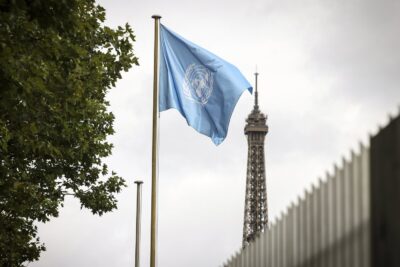US says it’s leaving UNESCO again, only 2 years after rejoining
By Canadian Press on July 22, 2025.

United Nations (AP) — The Trump administration announced Tuesday that it will once again withdraw from the U.N. cultural agency UNESCO, an expected move that has the U.S. further retreating from international organizations.
The decision to pull U.S. funding and participation from UNESCO comes two years after the Biden administration rejoined following a controversial, five-year absence that began during President Donald Trump’s first term. The White House cited similar concerns as it did in 2018, saying it believes U.S. involvement is not in its national interest and accusing the agency of promoting anti-Israel speech.
The decision, which won’t go into effect until December 2026, will deal a blow to an agency known for preserving cultural heritage through its UNESCO World Heritage Sites program — which recognizes significant landmarks for protection, ranging from the Taj Mahal to Egypt’s pyramids of Giza and the Grand Canyon National Park. The agency also empowers education and science across the globe.
It is the Trump administration’s latest move to pull support for U.N. agencies under a larger campaign to reshape U.S. diplomacy. Under the “America First” approach, the administration has pulled out of the U.N. World Health Organization and top U.N. human rights body, while reassessing its funding for others.
State Department spokesperson Tammy Bruce said in a statement that the withdrawal was linked to UNESCO’s perceived agenda to “advance divisive social and cultural causes.”
She added that UNESCO’s decision in 2011 “to admit the ‘State of Palestine’ as a Member State is highly problematic, contrary to U.S. policy, and contributed to the proliferation of anti-Israel rhetoric within the organization.”
UNESCO director general Audrey Azoulay said she “deeply” regrets the U.S. decision but said it was expected and that the agency “has prepared for it.” She also denied accusations of anti-Israel bias, saying it contradicts “the reality of UNESCO’s efforts, particularly in the field of Holocaust education and the fight against antisemitism.”
Azoulay added that “the reasons put forward by the United States of America are the same as seven years ago, even though the situation has changed profoundly, political tensions have receded, and UNESCO today constitutes a rare forum for consensus on concrete and action-oriented multilateralism.”
The Biden administration had rejoined UNESCO in 2023 after citing concerns that China was filling the gap left by the U.S. in UNESCO policymaking, notably in setting standards for artificial intelligence and technology education.
The withdrawal, which was first reported by the New York Post, came after a review ordered by the Trump administration earlier this year. While the U.S. had previously provided a notable share of the agency’s budget, UNESCO has diversified its funding sources in recent years as the U.S. contribution has decreased. Today, American assistance represents only 8% of the agency’s total budget.
Azoulay pledged that UNESCO will carry out its missions despite “inevitably reduced resources.” The agency said that it is not considering any staff layoffs at this stage.
“UNESCO’s purpose is to welcome all the nations of the world, and the United States of America is and always will be welcome,” she said. “We will continue to work hand in hand with all our American partners in the private sector, academia and non-profit organizations, and will pursue our political dialogue with the U.S. administration and Congress.”
The U.S. previously pulled out of UNESCO under the Reagan administration in 1984 because it viewed the agency as mismanaged, corrupt and used to advance the interests of the Soviet Union. It rejoined in 2003 during George W. Bush’s presidency.
___
Petrequin reported from Brussels.
Samuel Petrequin And Farnoush Amiri, The Associated Press
-18




